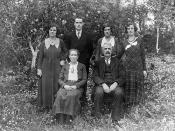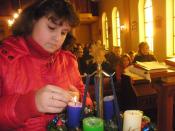The title "Advent", immediately introduces a religious motif - Advent being the four week period in the Catholic Church which immediately precedes Christmas. Advent is traditionally a period of penance and preparation of contrition and denial. In this poem, Kavanagh draws an analogy between the season of Advent and the nativity which follows and his own wish to rediscover the innocence and wonder of a child's mind. The theme has much in common with Vaughen's "Retreate", in which the poet seeks to return to prenatal existence.
The opening lines represent Kavanagh's confession of guilt, he has committed the sin of gluttony, a metaphor - for original sin. The lover of the opening line is Kavanagh's inner-self, his id or soul. He recognises that wonder, awe, imagination and magic of a child's mind is directly related to their innocence and lack of knowledge. If the window of knowledge is open wide, the reality of life becomes apparent and a child's sense of wonder is no longer, "Through a chink too wide there comes in no wonder".
Kavanagh hopes that by submitting himself to the penance of Advent, he can cleanse his mind of this knowledge, as the soul is cleansed of sin - that he can return that knowledge to the tree of knowledge, as it had been stolen by man and was of no use to him. Kavanagh sees original sin - the eating of the tree of knowledge by Adam and Eve and their subsequent banishment from Eden, as the reason why mankind must suffer the loss of childhood innocence. The legacy of original sin is this loss which Kavanagh wants to retrieve. Kavanagh hopes to cleanse his mind of the knowledge he has gained through experience of life "tested and tasted too much" and require "the luxury of...


